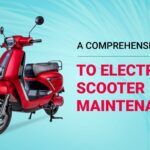- Electric Scooter in India
- Do You Need License for Electric Scooter in India
- Understanding the Legal Framework in India
- Driving License Requirements for Electric Bikes and Scooters
- Insurance Regulations for Electric Scooters and Bikes in India
- Number Plate Requirements for Electric Vehicles in India
- Helmet Regulations for Riding Electric Vehicles in India
- Electric Vehicle Registration and Road Tax Guidelines in India
- Determining License Requirements for Electric Bikes in India
- Obtaining a License for an Electric Bike in India: Step-by-Step Guide
- The Advantages of Holding a License for an Electric Bike in India
- Safety Tips for Beginner’s Guide to Riding an Electric Bike
- E Bike License FAQs
- Conclusion
- Choose iVOOMi Electric Scooter for a Smarter Ride!
Electric Scooter in India
Electric bikes or e-bikes are a relatively newer mode of transportation. But, even at an embryonic stage, they have achieved phenomenal popularity both globally and in India. By being a greener alternative to conventional petrol-run bikes and being more value for money in the long run, e-scooters are truly dominating the current two-wheeler market. According to a 2022 study, about 470000 electric two-wheelers were sold worldwide, and it is predicted that the number will increase to 9 million by 2024.
In India, the buzz of e-bikes has been ringing high. The fact that Ola received 1 lakh subscriptions to Ola electric scooters is a strong enough testament to tell us about the growing popularity of electric bikes in India. The bank-breaking and constantly rising prices of petrol is a very strong reason why Indians are shifting towards an alternative mode of swift and easy transport. If you have already joined the electric bike bandwagon or are looking to buy one soon, then this blog on the laws around electric bikes in India will, definitely, come in handy. So, without much delay, let us dive in!
Do You Need License for Electric Scooter in India
Like any other motorbike, electric scooters in India also have driving license requirements. The only exceptions are the ones with low-speed limitations. When you own a motorcycle license, you can only operate a two-wheeled motorcycle that runs on electricity. In addition, irrespective of the e-bike you have, it is a must that you also have a driving license.
Simply put, e-bikes that have a motor that generates more than 250 watts need a license in India. Furthermore, if your electric bike can obtain a top speed of more than 25 kmph, you would also need a driving license. These vehicles need to be registered, as well.
Understanding the Legal Framework in India
It goes without saying that as more and more people in India are resorting to electric bikes, it is pivotal to be familiar with RTO regulations. Unlike traditional two-wheelers, electric bikes are subjected to different rules and laws in India. Of course, the riders of e-bikes must abide by the same traffic regulations as motorcyclists, including halting at stops and yielding to pedestrians. In addition, there are others that have to be followed.
Electric bikes with a power output of less than 250 watts and a top speed of 25 kilometers per hour are within the umbrella of any transportations rules, such as taxes, registration, insurance, etc. However, it is completely the opposite for high-speed e-bikes. If you want to know more about the legal frameworks related to high-speed, efficient, and robust e-bikes suitable for commuting, then read ahead!
Driving License Requirements for Electric Bikes and Scooters
Electric bikes are a novel phenomenon in India, but they are seeping into the mainstream psyche very quickly. Similar to the operation of any kind of vehicle, e-bikes also need a valid driver’s license. The basic driving license requirements for electric bikes and scooters that everyone should know about include –
- It is against the law to ride an electric bike or scooter on a public road without a valid driver’s license.
- If you cause an accident or damage someone else’s property while riding an e-bike without a driving license, your insurance company will not pay for the repairs or medical bills.
- You do not need a license to ride an e-scooter with a maximum speed of 25 kilometers and a power usage of less than 250 watts. Such two-wheelers are good options for young adults and senior citizens.
Insurance Regulations for Electric Scooters and Bikes in India
Many young people make the grave mistake of riding an electric bike without adequate insurance coverage, which may culminate in legal trouble. If not handled carefully, electric bikes with top speeds of up to 25 kilometers per hour can also cause serious injury or property damage. Thus, it is pivotal that every e-bike ride has an insurance policy.
Although, a no-registration e-scooter with a power usage of 250 watts or less does not require insurance coverage, it is best to have one anyways, as your repair or medical bills will be taken care of in an accident. Some of the documents you might need to insure your e-bike or scooter include –
- Proof of address such as your PAN card
- Proof of identity such as your passport or your Aadhar card and
- Two passport-sized photographs
Number Plate Requirements for Electric Vehicles in India
After April 1, 2029, all registered vehicles of India are mandated to display a High Security Registration Plate (HSRP) under the Central Motor Vehicle Rules, 1989. Moreover, only law enforcement personnel are authorized to offer the HSRP, which aids in preventing theft and clearing vehicles from the system. Some of the basic number plate requirements for electric vehicles in India include –
- To make the process of differentiation among different e-vehicles easier, each has been assigned a special color code.
- A special license plate demonstrates a private electric vehicle with a green background and white letters.
- A license plate with a green background and yellow letters is atypical of EVs used in the commercial sector.
- Lastly, RTO registrations and HSRPs are not mandatory for electric bikes with a maximum power outfit of less than 250 watts and a maximum speed of 25 kilometers per hour.
Helmet Regulations for Riding Electric Vehicles in India
When using an electric vehicle with a top speed of 25 kilometers per hour, it is mandatory to wear a helmet. Although riding electric scooters with a maximum power output of 250 watts and a top speed of 25 kilometers per hour do not need helmet usage, it is strongly advised to wear one for safety.
Some of the things to keep in mind while buying a helmet for two-wheeler electric vehicles include –
- The helmet must comply with all the required quality standards and have an ISI mark.
- Helmets with ISI mark ensure protection to the rider, and they have been approved by the Indian government after conducting multiple tests.
- ISI-marked helmets are ideal when trying to prevent blood clots, skull damage, and likewise.
- As per another government directive of 2020, only helmets certified by the Bureau of Indian Standards (BIS) are legal for two wheelers in the country.
Electric Vehicle Registration and Road Tax Guidelines in India
Electric vehicles with a speed of 25 kilometers per hour and more along with a power usage of more than 250 watts have to be registered under RTO. The Ministry of Road Transport and Highways (MoRTH) have recently exempted EVs from paying fees for a registration certificate. It is excellent news, as e-bike and e-car owners will not have to pay anything for insurance or the renewal of their electric vehicles.
- According to the Indian governmental regulations, electric vehicles don’t have to pay road tax.
- The documents required to register an electric vehicle in India include an address proof, such as a voter ID or AADHAR card, and an identity proof, such as a PAN card or driving license.
- All electric vehicles must be approved by the Automotive Research Authority of India.
Determining License Requirements for Electric Bikes in India
Electric bikes with a power output of less than 250 watts and a top speed of 25 kilometers per hour are within the umbrella of any transportations rules, such as taxes, registration, insurance, etc. However, it is completely the opposite for high-speed e-bikes.
- It is against the law to ride an electric bike or scooter on a public road without a valid driver’s license.
- If you cause an accident or damage someone else’s property while riding an e-bike without a driving license, your insurance company will not pay for the repairs or medical bills.
- You do not need a license to ride an e-scooter with a maximum speed of 25 kilometers and a power usage of less than 250 watts. Such two-wheelers are good options for young adults and senior citizens.
Obtaining a License for an Electric Bike in India: Step-by-Step Guide
The State’s Transport Authority (RTA) or Regional Transport Offices issue driving licenses in India. As per the Motor Vehicles Act of 1988, all motor vehicles must be registered with their regional transport offices. The steps you need to follow to apply for a driving license for your electric bike include –
- Visit the official Parivahan website
- Click on the online services section and choose ‘Driving License Related Service’s
- Select the state from which you want to apply
- Fill in the details, such as name, mobile number, address, etc
- Upload documents for driving license, such as identity proof, address proof, etc
- Fill in the details, such as name, phone number, address, etc
- Pay the application fee
- Book a time slot for the driving test
- Appear for the driving test
- Your permanent driving license will be delivered to your current address if you pass the test
The Advantages of Holding a License for an Electric Bike in India
The benefits of holding a license for an electric bike in India include
- You can operate your e-bike throughout public roads without supervision
- Your driving license is valid throughout the country
- Your driving skills get validation
- It is an important document for verifying your age, nationality and identity
- A driving license in India is valid for 20 years
Safety Tips for Beginner’s Guide to Riding an Electric Bike
Safety checks are also very important for an e-bike. Check the brakes, tires, handles, and motor of your electric scooter regularly to keep hazards at bay. Some rules you can adhere to include –
- Wear the right safety gear
- Conduct a pre-ride inspection
- Familiarize yourself with e-scooter controls
- Know the local rules and regulars
E Bike License FAQs
Now that we know about the A to Z of legal requirements for riding an electric bike in India, let us find answers to some common questions.
Q1. What is the difference between low-speed and high-speed electric scooters
Ans: A low-speed electric scooter has a top speed of 25 kilometers per hour and a maximum power output of 250 watts. On the other hand, a high-speed e-scooter speed limit is above 25 kilometers per hour, and its power output is more than 250 watts.
Q2. Do I need to register my electric scooter with the local Regional Transport Office (RTO)?
Ans: Yes, you have to register your electric scooter with the local RTO if your e-bike is a high-speed one, whose speed limit is more than 25 kilometers per hour and power output more than 25 watts.
Q3. Are there any insurance requirements for electric scooters in India?
Ans: Yes, high-speed e-scooters with a speed of 25 kmph must be insured. But, no-registration e-bikes should also get an insurance cover for protection.
Q4. Are these license requirements the same across all states in India?
Ans: Yes, license requirements for e-bikes are the same across all Indian states.
Q5. Can a 16-Year-Old Legally Drive an Electric Bike in India?
Ans: The age limit to ride an e-scooter in India is 16 years. However, teenages between 16 to 18 years are mandated to undergo a requisite test to attain an e-bike license.
Conclusion
So, there we have it, a comprehensive overview of the laws surrounding license, registration, insurance, and more of electric bikes in India. Although, most of the legalee for e-scooters is similar to conventional motorbikes, there are some distinctions that need acknowledgement. Needless to say, for a safe and secure ride on your e-bike, make sure that you have a driving license, insurance, and also a helmet.
Choose iVOOMi Electric Scooter for a Smarter Ride!
Get the most phenomenal electric scooter experience with iVOOMi. Equipped with high-performance acceleration, amazing riding range, interchangeable and light-weight batteries, and higher overall efficiency, these e-bikes are made to change your perception about motorcycle commute. So, join the e-bike fam with iVOOMi today!


